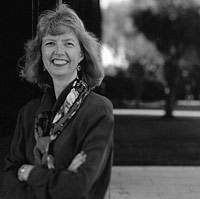| |
 |
| |
Daryl
Koehn '86 |
| |
|
Writing
the wrongs
Ethicist
Daryl Koehn '86 offers insights to those hoping to avoid a
fall from grace
by
Rebecca Lindell
The iconic
images of victory in Iraq, including a tumbled statue of Saddam
Hussein, were everywhere in the spring of 2003.
The seemingly
swift resolution to the conflict appeared to have blunted
the intense moral questioning that preceded the war. But at
least one observer — business ethicist Daryl Koehn '86 —
was already pondering the implications for the United States
if the weapons of mass destruction allegedly in Iraq failed
to materialize.
More
than a year later, her remarks to a BusinessWeek reporter
in April 2003 seem prescient.
"I don't
think we've been very clear about the justification for our
attack on Iraq," Koehn said then. "If you can truthfully characterize
Saddam as an imminent threat to us, then you can say that
the war was justified."
But without
the weapons of mass destruction, the Bush administration could
find itself creating new rationalizations for the war. And
if that happens, she mused, "it's going to cause some problems
for us."
"How
are we going to prove that Saddam had been actively seeking
the weapons? Even if we do, it's a tricky argument. If Saddam
has been seeking these weapons for 15 years and never got
them, it shows we were pretty successful at containing him.
In that case, he wasn't the threat we're claiming he was."
And if
the weapons of mass destruction never turn up? "We're going
to have a problem with credibility," Koehn said.
The magazine
found Koehn's reflections sufficiently compelling to return
to her a year later for follow-up commentary on Iraq.
"We should
be very honest about what the situation is," Koehn offered
in April 2004. "I don't like this language of us 'transferring
sovereignty.' Sovereignty means recognized authority, which
usually means legitimate authority.
"No sovereignty
has been established in Iraq, so there is no sovereignty to
transfer. We've got to be clear on that point. Otherwise,
it sounds as if we established legitimacy there and handed
it over, and then if the Iraqis fail, they're to blame. That's
a very misleading way to think of things."
Koehn's
cogent take on the crisis in Iraq grows out of a career spent
thinking deeply about such issues. A graduate of The Managers'
Program at Kellogg, Koehn also holds a PhD in ethics from
the University of Chicago and a master's degree in politics,
philosophy and economics from Oxford University. She has held
academic positions at Illinois Wesleyan University, DePaul
University and the University of Chicago, and has written
several books on business ethics.
Now the
executive director of The Center for Business Ethics at the
University of St. Thomas in Houston, her insights have appeared
in The New York Times, CFO and CIO magazines,
the Harvard Business Review, and in international newspapers
and magazines.
Koehn's
rise as an authority on business ethics was given an unexpected
boost by the collapse in 2001 of Houston-based Enron. Koehn
says she found herself at the "second Ground Zero in America,"
with media around the world asking her to comment on the company's
implosion.
For Koehn,
the scandal hit close to home. Among her students were Enron
employees, many of whom were "blindsided and shocked" by the
scandal. For Koehn, Enron's woes suggest a broader ethical
crisis.
"The
problem isn't that people don't know the right thing to do,"
she says. "It's that we human beings are infinitely creative
when it comes to rationalizing our actions. We develop blind
spots. We tend to think our motives are completely pure while
those of our critics are completely impure.
"It's
very easy to lose perspective when we become self-righteous.
Having lost perspective, we unwittingly do horrible things."
As for
the businessperson seeking to avoid the hard falls of some
high-flying peers, Koehn offers this simple advice: Pay close
attention to the company you keep.
"It's
much easier to join a good, sound company run by thoughtful,
self-critical people than to go to work for a problematic
company and have to extricate yourself later," Koehn says.
"You'll have a lot less heartache if you look before you leap."
|





